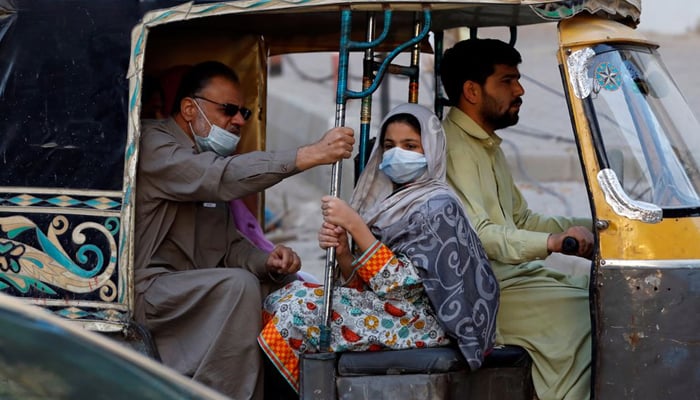
ISLAMABAD: Pakistan’s active coronavirus cases jumped past 35,000 for the first time since October 15, 2021, when the country recorded 26,974 cases, National Command and Operation Centre’s (NCOC) data showed Monday morning, as it gets ready to review coronavirus curbs in a meeting scheduled for today.
The NCOC had on Saturday reviewed the existing protocols and called on the health and education ministers to suggest a new set of guidelines amid the fifth wave of coronavirus that has the government worried.
As many as 4,340 new cases were recorded in the last 24 hours after 49,809 tests were taken. The active case count stood at 35,884.
This is the third consecutive day of Pakistan recording COVID-19 cases over the 4,000-mark, which is the highest daily tally since August 25 last year.
Meanwhile, seven deaths due to COVID-19 pushed the death toll to 29,019, the NCOC’s data showed.
The positivity ratio was detected at 8.71% and the overall cases have reached 1.328 million, while the recoveries stand at 1.26 million.
A new set of SOPs will be put forth in today’s NCOC meeting, with its focus on schools and the education sector as a whole, public gatherings, marriage ceremonies, indoor/outdoor dining, and the transport sector.
Amid rising cases in the country due to the Omicron variant, the forum decided to extensively engage with provinces, especially with the Sindh government for necessary measures to tackle the rising coronavirus numbers.
Curbs
With regards to the aviation sector, the NCOC, in the Saturday meeting, had decided to implement a complete ban on inflight serving of meals and snacks with effect from January 17.
The NCOC had asked the Civil Aviation Authority (CAA) to ensure inflight mask-wearing and also implement COVID-19 SOPs at all airports.
Similarly, serving meals and snacks in public transport will also be banned with effect from January 17.
The forum had asked the federating units to take strict measures against violators of existing SOPs, especially those not wearing masks. It also directed them to ensure enforcement of obligatory vaccination regime.
NCOC had also directed federating units to strictly enforce existing protocols especially in transport, education, and sectors; and in public spaces like restaurants and wedding halls.
Moreover, federating units were asked to carry out immediate surveys of health care facilities (including oxygenated beds), oxygen stocks, and reserves.
The NCOC had directed all quarters to fast-track vaccination drive and ramp up efforts to achieve vaccination targets.






